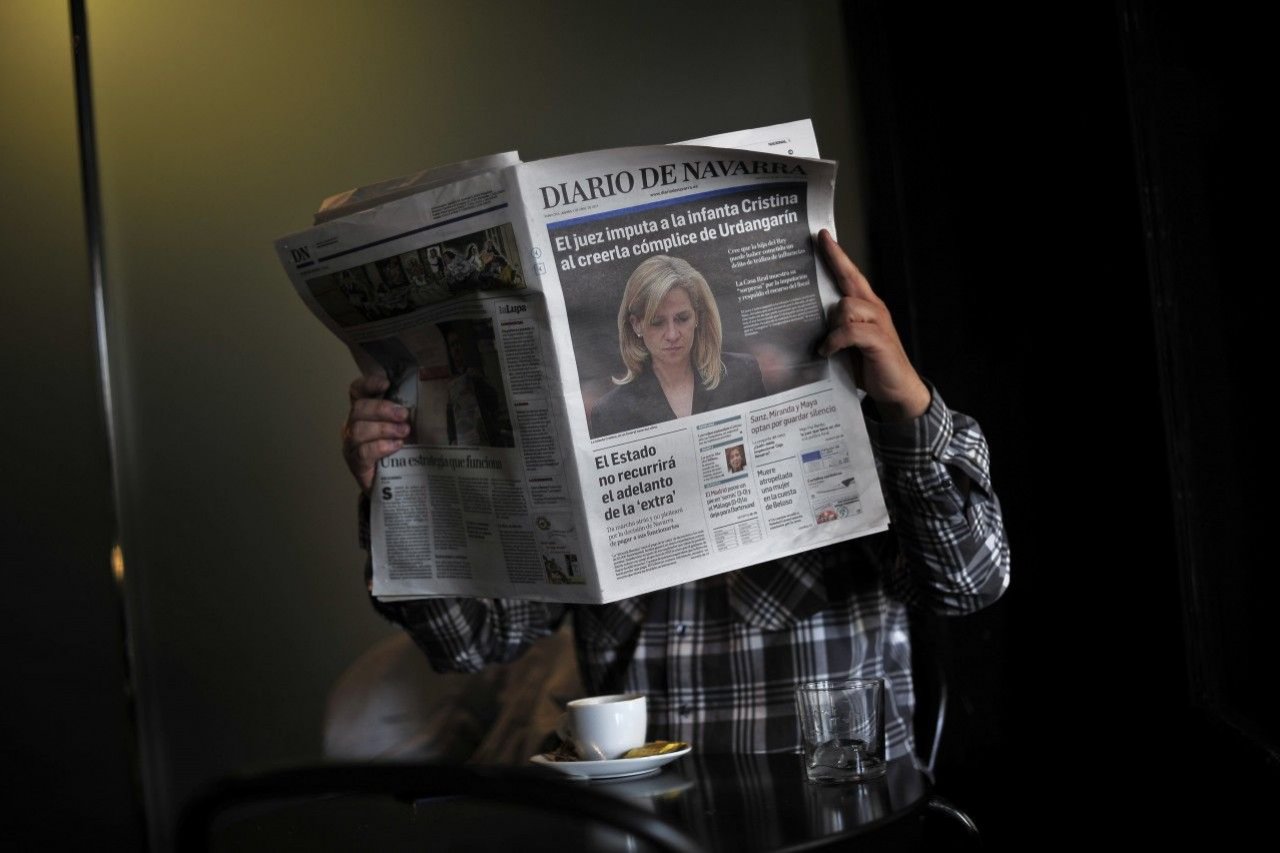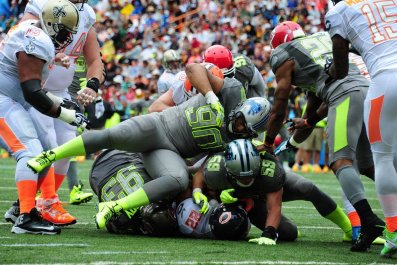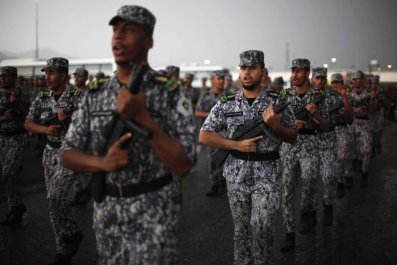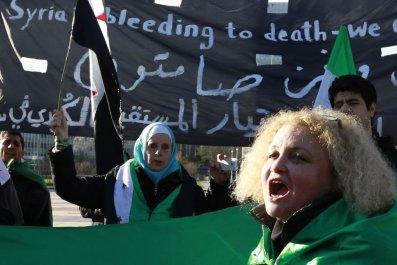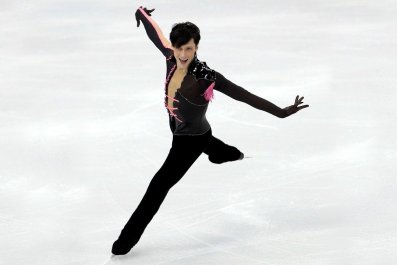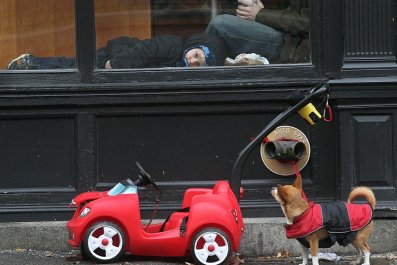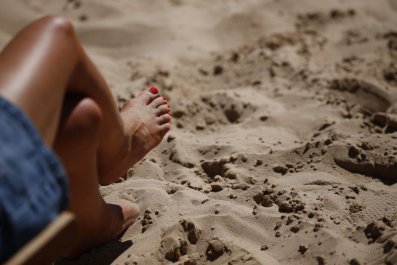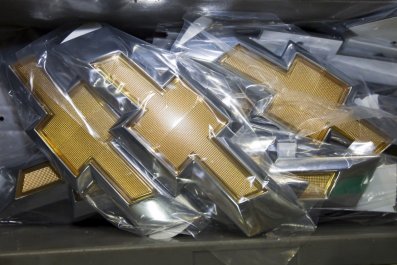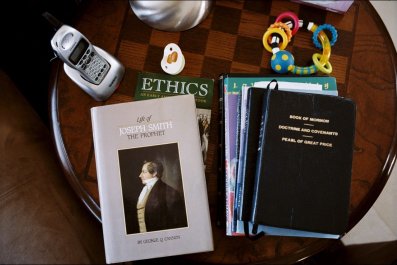Whatever happened to Happily Ever After? No storybook princess was ever asked to explain whether she was on the take. In Spain, however, the royal family finds itself in a legal mess that could alter the way the constitutional monarchy is seen both at home and abroad.
As there is no legal precedent for when the worlds of royalty and criminality collide, the examination of the king of Spain's daughter Cristina de Borbón, 48 - known officially as Infanta Cristina, duchess of Palma de Mallorca - has taken a long time to arrange.
On February 8, a Spanish judge will question the princess, the youngest daughter of King Juan Carlos, as a suspect in an alleged embezzlement scheme. The public prosecutor says the princess's husband and his business partner funneled around $11 million from public coffers into their private bank accounts.
On Saturday, January 11, the princess's lawyers said they would not appeal a summons from the investigative judge, José Castro, so she will personally field questions from his inquiry into possible charges of tax fraud and money laundering.
Cristina's husband, the former Olympic handball player Iñaki Urdangarin, who turned 46 a few weeks ago, and his business partner, Diego Torres, are accused of embezzlement, fraud, money laundering, tax evasion and falsifying documents. Prosecutors claim that between May 2003 and December 2008, their nonprofit Nóos Foundation, in cahoots with local politicians, overcharged the regional governments in Valencia and the Balearic Islands, as well as Valencia city hall, for consultancy work and to organize several sports and tourism conferences.
It is suggested Torres and Urdangarin then channeled the funds into various dummy firms and eventually into a number of private accounts around the world. The firms allegedly listed phantom employees who neither worked nor were paid but whose presence on the books afforded generous tax breaks.
According to Spanish law, the judge can subpoena witnesses to testify as part of the pretrial investigation and also issue a summons known as an imputación that falls between an American-style subpoena and an indictment. The summons means there is evidence the person being questioned may have committed a crime.
Castro summoned the princess last spring, but the public prosecutor, the public defender's office and Cristina's lawyers appealed on grounds that there was no evidence linking the princess to the alleged crimes. A provincial court blocked the summons, but suggested Castro investigate further.
The judge's second effort was published in January. Castro - who has been applauded on the street by those who recognize him - contends that there is enough preliminary evidence to warrant a summons to testify in court.
For instance, the princess sat on the Nóos Foundation board until 2006, when both she and Urdangarin left the foundation (reportedly on instructions from the royal palace). The princess is the only member of the Nóos board from that time whom Castro has not yet questioned as a possible suspect.
The royal couple were also joint shareholders in Aizoon, one of the alleged dummy companies used to funnel Nóos money into the masterminds' bank accounts. A witness testified that Urdangarin's lawyer referred to the presence of the princess as a "shield against the tax office."
After combing through both Aizoon's accounting records and the princess's financial history, the judge concluded that many of the firm's operating expenses were really Cristina's personal and family expenses. Urdangarin and Cristina have four children, ages 8 to 14.
Castro cited receipts for hotels in Rome; Washington, D.C.; New York; and Detroit, restaurants in Barcelona, and family trips to Rio de Janeiro, South Africa and Mozambique. From press clips, the African trip appears to have been a mixture of vacation, safari and visiting health centers and laboratories as part of the princess's charity work.
Other Aizoon expenses included buying a painting worth around $6,000, items from a children's furniture store worth $2,470, four Harry Potter books, dance lessons, and parties for kids.
Aizoon soon changed its address to the couple's mansion in Barcelona, apparently paying the couple rent for use of an office. But even before changing the address, Aizoon paid around $243,000 for renovations to the mansion and $12,600 for curtains. Castro called Aizoon's presence in their home "a phantom office without clients or employees."
"What appears to be clear is that the receipts for personal expenses that [the princess] charged to Aizoon constituted a double fraud," the judge wrote in his latest findings. "On one hand they were income that she never declared in her income tax, and on the other, it lowered the company tax because they were considered operating expenses without being so....
"This court does not believe it will shake the pillars of the rule of law if it wants to inquire about details from the person who owned 50 percent of Aizoon, is the wife of the other shareholder, had the company registered in her home, and who in addition profited from at least half of embezzled money."
In 2009, Spanish taxpayers supported the royal family and financed their duties with around $12.1 million. The royal budget has since dropped around 11 percent.
The investigation into Nóos began in September 2010 as part of the suspected fraud surrounding the construction of the Palma Arena sports complex on the island of Mallorca. The former regional president of the Balearic Islands, Jaume Matas, was last year sentenced to six years in prison for his role in the corruption. During that investigation, Torres handed over documents that started the paper trail against him and his alleged co-conspirators.
The Nóos embezzlement scandal crowns a list of recent embarrassments for the Spanish monarchy. The Royal Palace has excluded Urdangarin from taking part in official events and last year almost completely removed all trace of him from its website. Since August, Cristina and her family have taken refuge in Geneva.
Previously, the Spanish press gave a wide berth to the royals due to their relative humbleness compared to their European counterparts, and because King Juan Carlos piloted Spain from a dictatorship to a democracy in 1975 after the death of the dictator Francisco Franco brought 37 years of fascism to an end. The king also helped defuse a coup attempt in 1981 when Civil Guardsmen took the parliament hostage.
These debts of honor, however, have been losing their potency in the light of recent events. In 2012, for example, Spaniards and the press pulled no punches when it was discovered that Juan Carlos, at a time when the country was mired in an economic recession, had been hunting elephants in Botswana.
A recent poll said that 62 percent of Spaniards want the king, now 76, to abdicate in favor of his son Felipe, up from 45 percent last year. The king's approval rating dropped to 41 percent from 76 percent two years ago.
Prior to the scandal, Cristina and Urdangarin were generally well-regarded in Spain. Cristina earned a political science degree in Madrid before completing a master's in international relations at New York University. She worked for the United Nations, various health-related charities, and was recently hired by Spanish bank La Caixa's social programs division. An avid athlete, the princess was a member of Spain's Olympic sailing team in 1988. She met Urdangarin at the 1996 Olympics in Atlanta, where he won a bronze medal in handball. They married in 1997.
Opposition to her summons last year sparked outrage in Spain; evidence that the administration did not work for citizens but for the monarchy. Castro wrote last week that not allowing the court to question the princess was "absurd," especially considering that no one opposed the summons of Torres's wife, who, like the princess, was a shareholder in a few of the alleged dummy companies and who was also found by a tax department investigation to have not participated in the suspected fraud.
And from a legal standpoint, he said, arguing that the princess was ignorant of her husband's activities was jumping ahead to the verdict and skipping the pretrial investigation that happens every day in Spanish courts.
"To anticipate that [the princess] did not know about her husband's activities and the criminal implications of her actions is as precipitous as unrelentingly affirming the opposite," Castro said. "The only thing that is called for is to give her the possibility to explain - in person and not through the filter of her attorney - specific, objective signs of criminality, not fruits of a capricious imagination."
Castro ends his report saying that the princess's testimony is also important because it is still not clear how much Aizoon money the couple spent. And the law states that a person who profited from illegal activity, even unknowingly, must return the money.
Why did the princess decide to obey the summons this time? It could be because with the judge's suspicions and her financial records now in the public domain, an appeal would make her look guilty.
The question now is whether she will answer the judge's questions or invoke her right to remain silent. And if she does talk, will she continue her lawyers' strategy and place the blame on her husband?
The princess's long legal saga is just beginning.



